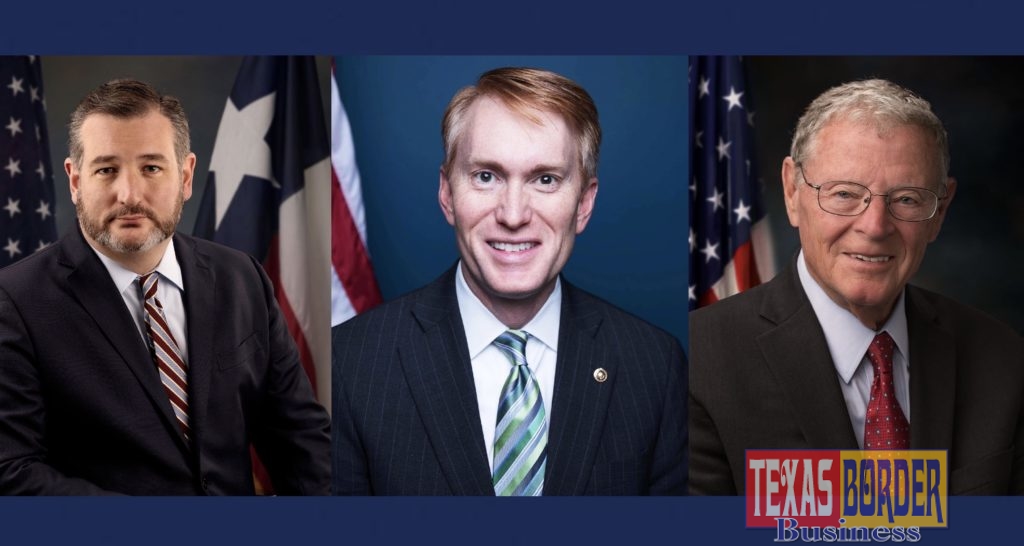
Texas Border Business
HOUSTON, Texas – U.S. Sens. Ted Cruz (R-Texas), James Lankford (R-Okla.), Jim Inhofe (R-Okla.), and colleagues in the Senate on Tuesday sent a letter to Steven Mnuchin, Secretary of the Treasury, and Jovita Carranza, Administrator of the Small Business Administration (SBA) to thank them for the recently issued interim final rule on protections for faith-based entities during the continued rollout of the Coronavirus Aid, Relief, and Economic Security (CARES) Act and related federal economic relief. The Administration also issued an FAQ for the Paycheck Protection Program (PPP) and Economic Injury Disaster Loans (EIDL) programs to clarify that faith-based entities, including houses of worship, are eligible for the PPP and EIDL and will not need to sacrifice their religious missions to comply.
The letter also asks the Administration to ensure that no otherwise-qualified, faith-based entity is denied relief due to its affiliation with other entities as an aspect of its religious practice. Additionally, the letter asks that the Administration allow for maximum participation by faith-based entities and monitor the action of lenders to ensure faith-based entities are not discriminated against.
In the letter they wrote:
“It was Congress’ intent that the $349 billion in loans for payroll costs, mortgage interest, rent, and utilities that was authorized under the Paycheck Protection Program (PPP) as well as the expansion of the Economic Injury Disaster Loan Program (EIDL) would help businesses and nonprofits, including those with faith missions, stay afloat and keep employees on their payrolls during this time, as such, we were glad to see the additional guidance and clarification issued on April 3, 2020 to make it clear to lenders and borrowers that faith-based entities are able to participate in these two loan programs.
“As we repeatedly brought to your attention, without these assurances, many of our nation’s most impactful faith-based entities would have been unable to participate in the PPP due to undue restrictions on their sincerely held religious beliefs, thereby forcing them to choose between abandoning their faith mission or closing their doors to both employees and the communities they serve.”
Joining Sens. Cruz, Lankford, and Inhofe in the letter are Sens. Thom Tillis (R-N.C.), Kelly Loeffler (R-Ga.), Kevin Cramer (R-N.D.), Mike Braun (R-Ind.), Steve Daines (R-Mont.), Marsha Blackburn (R-Tenn.), Richard Burr (R-N.C.), Roy Blunt (R-Mo.), Todd Young (R-Ind.), Mike Rounds (R-S.D.), Joni Ernst (R-Iowa), John Thune (R-S.D.), Rand Paul (R-Ky.), Mike Enzi (R-Wyo.), Rick Scott (R-Fla.), and Mike Lee (R-Utah).
Read the full letter here and below.
Dear Secretary Mnuchin and Administrator Carranza:
Thank you for the work the Small Business Administration is doing to respond to and implement the policies laid out in the Coronavirus Aid, Relief, and Economic Security Act (“CARES Act”) as quickly as possible while protecting religious liberty. As you are well aware, many businesses of all sizes are suffering greatly from the economic distress caused by COVID-19. In many ways, that strain is felt even more severely by nonprofit organizations – especially faith-based entities – because an even greater number of people continue to depend on these organizations for support services amid the public health crisis, despite a drop in funding.
It was Congress’ intent that the $349 billion in loans for payroll costs, mortgage interest, rent, and utilities that was authorized under the Paycheck Protection Program (PPP) as well as the expansion of the Economic Injury Disaster Loan Program (EIDL) would help businesses and nonprofits, including those with faith missions, stay afloat and keep employees on their payrolls during this time.
As such, we were glad to see the additional guidance and clarification issued on April 3, 2020 to make it clear to lenders and borrowers that faith-based entities are able to participate in these two loan programs
As we repeatedly brought to your attention, without these assurances, many of our nation’s most impactful faith-based entities would have been unable to participate in the PPP due to undue restrictions on their sincerely held religious beliefs, thereby forcing them to choose between abandoning their faith mission or closing their doors to both employees and the communities they serve.
While these guidelines are an incredibly helpful resource, the task is not yet complete. It is now the responsibility of the Administration to ensure that these policies are adhered to, and that faith-based entities and houses of worship remain on an equal playing field with all other businesses that qualify for these loans.
The Administration must ensure that in accordance with the First Amendment, Religious Freedom Restoration Act and long-standing Supreme Court precedent, no otherwise qualified faith-based entity is denied relief due to its affiliation with other entities as an aspect of its religious practice. As acknowledged in the IFR, the government should not be involved in questions of church governance.
The IFR also makes clear that a “faith-based organization seeking loans under [SBA loan programs] may rely on a reasonable, good faith interpretation in determining whether its relationship to any other person, group, organization, or entity is exempt from the affiliation rules under this provision, and SBA will not assess, and will not require participating lenders to assess, the reasonableness of the faith-based organization’s determination.” As such, it is our expectation that the Administration continues to monitor the action of lenders to ensure that this policy is followed and that faith-based entities are not discriminated against.
Additionally, we were glad to see further clarifications provided in the FAQ to give faith-based entities that need this economic support peace of mind that their sincerely held beliefs will not be in jeopardy if they participate in SBA loan programs. We ask that the Administration continue to monitor these policies to ensure they are followed and allow for maximum participation by faith-based entities. The Administration must ensure that:
- No otherwise eligible organization will be disqualified from receiving a loan because of the religious nature, religious identity, or religious speech of the organization.
- A church is eligible even if it didn’t file for tax exempt status, as long as it meets the requirements of a 501(c)(3).
- Nonprofit entities are eligible for the PPP program without regard to whether nonprofit entities provide secular social services.
- Unique burdens or limitations are not imposed on faith-based organizations, and loans can be used to pay the salaries of ministers and other staff engaged in the religious mission of institutions.
- A faith-based organization that receives a loan will retain its independence, autonomy, right of expression, religious character, and authority over its governance, and no faith-based organization will be excluded from receiving funding because leadership with, membership in, or employment by that organization is limited to persons who share its religious faith and practice.
- Nondiscrimination requirements do not limit a faith-based entity’s autonomy with respect to membership or employment decisions connected to its religious exercise, nor will such regulations apply to the performance of church ordinances, sacraments, or religious practices, unless such application is the least restrictive means of furthering a compelling governmental interest.
- Any legal obligations incurred through receipt of this loan are not permanent, and once the loan is paid or forgiven, compliance will no longer apply.
We appreciate your specific attention to these matters as you work to ensure resources authorized by the CARES Act are implemented as swiftly as possible in accordance with the religious freedom protections guaranteed under the First Amendment.















